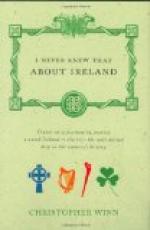and fictitious—or when sincere—save
in certain splendid exceptions, of whom Mr. Laing
is the honoured chief, and the only Home Ruler who
makes me doubt the rightness of my own conversion—it
is a mere sentimental impulse shorn of practical power
and working capacity. In any case it is a one-sided
thing, leaving out of court Ulster, the integrity
of the Empire, and the obligations of historic continuity.
It is a cry that has been echoed by violence and murder,
by outrage and ruin, and that has in it one overwhelming
element of weakness—exaggeration.
It is the cry at its best of enthusiasts whose ideas
of human life and governmental potentialities are too
generous for every-day practice—at its
worst but another word for self. For the men
who raise it and hound on these poor dupes to their
own destruction are men who would be rulers of the
country in their own persons, or members of a Gladstonian
ministry, were the Home Rule party to come to the
front. With neither section does the strength,
the glory, the integrity, and the continuance of the
Empire count; and the honour of England, like the
true well-being of Ireland, is the last thing thought
of by either party. The motto of the one is:
“
Fiat justitia ruat caelum”—of
the other: “
Apres moi le deluge.”
The one abjures the necessities of statesmanship, the
other the self-restraints of patriotism. Surely
the good, wholesome, working principles of sound government
lie with neither, but rather with the steady continuance
of things as they are—modified as occasion
arises and the needs of the case demand.
FOOTNOTES:
[Footnote A: Lord Hartington’s statistics—and
Lord Hartington is a man whose word not his bitterest
enemies have dared to question or to doubt—are
these:
1880 (No coercion) 2,585 agrarian crimes.
1881 (Partial and weak coercion) 4,439 " "
1883 (Vigorous coercion) 834 " "
1888 (Vigorous coercion) 660 " "
]
[Footnote B: Mr. Hurlbert, a Roman Catholic,
an American, and a personal friend of Mr. Davitt—all
which circumstances give a special weight to his testimony,
now borne after frequent and lengthened and recent
visits to Ireland, and after close converse with men
of all classes and of all political and religious
views, says in his Ireland under Coercion:
“An Irish gentleman from St. Louis brought over
a considerable sum of money for the relief of distress
in the north-west of Ireland, but was induced to entrust
it to the League, on the express ground that, the
more people were made to feel the pinch of the existing
order of things, the better it would be for the revolutionary
movement.”—The Irish Question,
I., 193. By Dr. Bryce.]




